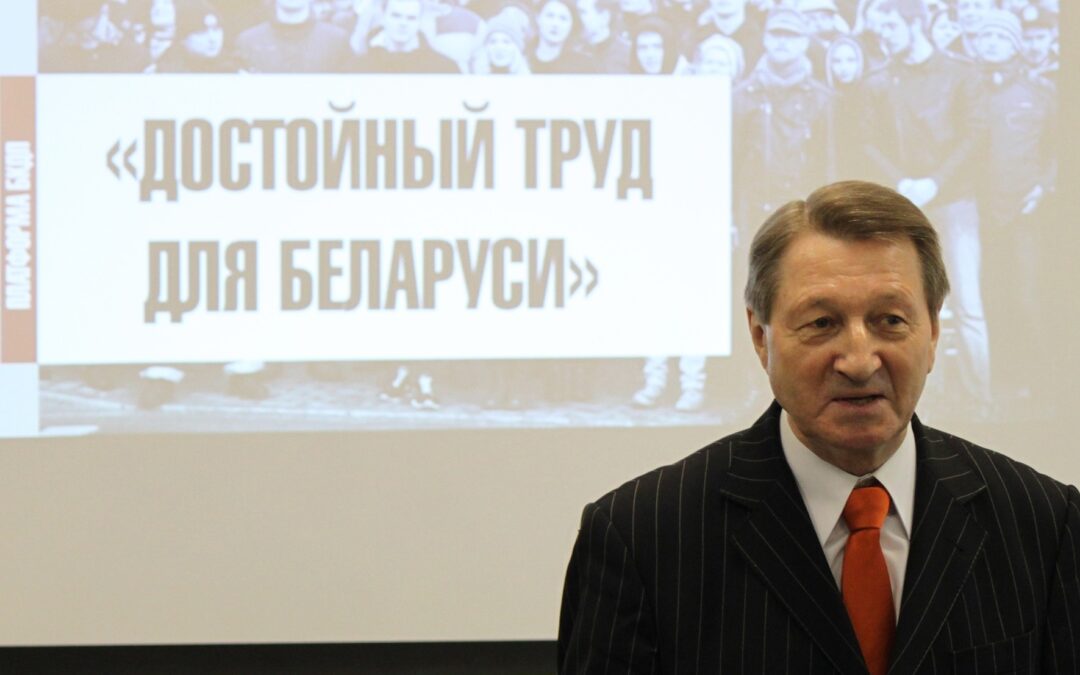
Dec 5, 2022
In the wake of a new wave of prison sentences against union leaders and other activists arrested earlier this year, new Belarus worker rights organization Salidarnast is tracking and disseminating updates on union political prisoners’ legal cases, and providing other worker rights news.
Belarusian Congress of Democratic Trade Unions (BKDP) President Aliaksandr Yarashuk, jailed since April and facing 14 years in prison, was elected in absentia to an ITUC vice-presidency at the organization’s 5th World Congress last month, reports Salidarnast.
Other updates include:
- Extraordinary mistreatment of two jailed union leaders, Leanid Sudalenka and Volha Brytsikava, for which Brytsikava reportedly started a hunger strike on November 8 and was released last week after having spent more than 105 days behind bars this year–including 75 consecutive days in the spring
- Continuation of a ten-person trial associated with worker organization Rabochy Rukh for which the accused are facing prison sentences of up to 15 years for high treason, among other charges
- Grodno Azot fertilizer factory worker and chairperson of the independent trade union there, Andrei Khanevich, whose phone was tapped by Belarusian special service, sentenced to five years in prison for speaking with a BelSat TV reporter
- Belarusian Independent Trade Union (BNP) Vice Chairperson and Chairperson of the Local Trade Union at Belaruskali fertilizer factory, Aliaksandr Mishuk—detained since May—sentenced to two and a half years’ imprisonment
- Free Trade Union of Metalworkers (SPM) Deputy for Organizational Work Yanina Malash—mother of a minor child and detained since April—sentenced to one and a half years’ imprisonment
- Vital Chychmarou, a former engineer fired in 2020 for trade union activities and manager of an SPM organization, sentenced to three years of home confinement
- Free Trade Union of Metalworkers (SPM) Trade Union Council Secretary Mikhail Hromau—detained since April—sentenced to two and a half years of home confinement
- Genadz Bedzeneu, who attempted to start a local union for Polotsk stall market workers, arrested.
Salidarnast is filling an information void created after the Lukashenko government in July forcibly shut down the BDKP and its affiliates, compounded by the detention of dozens of journalists and media workers with other civil society defenders. The number of political prisoners in Belarus stood at almost 1,500 in November, reports the European Federation of Journalists (EFJ); up from 1,000 in February. The Belarus Supreme Court in July dissolved the BKDP and its four affiliates: BNP, the Union of Radio and Electronics Workers (REP), Free Trade Union of Belarus (SPB) and SPM.
Salidarnast on December 1 flagged the arrest of at least five people at the Miory steel plant, warning of imprisonment risk for up to ten thousand people who contributed to the “Black Book of Belarus” which identified riot police.
“Despite the destruction of the independent trade union movement, workers in Belarus remain the force which can resist the dictatorship,” says Salidarnast.
The repression and eventual dismantling of the independent Belarus union movement began after hundreds of thousands of people, often led by union members , many of them women, took to the streets in 2020 to protest elections in which President Alexander Lukashenko declared himself winner in a landslide victory amid widespread allegations of fraud. The BKDP—the first Belarus union to be independent of government influence in the post-Soviet era—was founded 29 years ago and has been a member of the International Trade Union Confederation (ITUC) since 2003.
Hear more about workers’ fight for freedom by listening to a Solidarity Center podcast interview in which now-imprisoned BDKP Vice President Sergey Antusevich in 2021 spoke passionately about workers taking to the streets in defense of democracy. Antusevich has been jailed pending trial since April 2022.
(You can support jailed Belarusian union leaders—take action here).
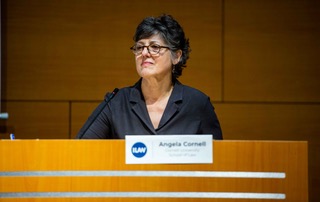
Oct 9, 2022
As the world witnesses some of the greatest challenges to democratic governments since the 1930s, unions offer a strong and essential counter to the trend, according to Cornell University Professor Angela Cornell.
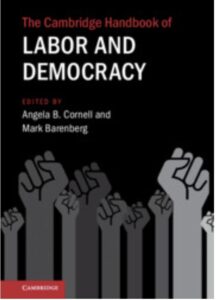 “Many studies show that organized labor has played critical role in developing and defending democracy. The organized working class was the primary carrier of democracy,” Cornell said today at the International Lawyers Assisting Workers Network (ILAW) Conference opening plenary.
“Many studies show that organized labor has played critical role in developing and defending democracy. The organized working class was the primary carrier of democracy,” Cornell said today at the International Lawyers Assisting Workers Network (ILAW) Conference opening plenary.
Cornell, co-editor of The Cambridge Handbook of Labor and Democracy, along with several book contributors, opened the Conference’s third and final day with a discussion of the handbook, an interdisciplinary and cross-regional anthology. (Hear Cornell and ILAW Board member Mery Laura Perdomo discuss unions and democracy on a recent Solidarity Center Podcast.)
More than 130 labor lawyers from 42 countries meeting October 7–9 also focused their final day on developing plans for Network’s coming years.
The Solidarity Center launched the ILAW Network in December 2018 as a global hub for worker rights lawyers to facilitate innovative litigation, help spread the adoption of pro-worker legislation and defeat anti-worker laws.
Unions Fuel Democracy
More than one quarter of the world’s population now live under democratically backsliding governments, including some of the world’s largest democracies.
Cornell listed the ways in which unions fuel democracy, including by providing a counterviling role to corporate power.
Further, said Cornell, “new research on the role of unions and in building solidarity among their members demonstrates the ways in which unions can bridge racial and national divides. Union members are less likely to support extreme views.”
Economic inequality is a destabiizing influence in most countries, Cornell said, and unions decrease inequality.
“Unions have been instrumental in the passsage of labor protections and the social safety net, including social security, minimum wage and overtime, workplace heath and safety and medical leave, among others.”
Unions Build Democracy in Latin America, Africa
Ken Roberts, a professor at Cornell University and book contributor, overviewed how unions have been bulwarks of democracy throughout Latin America.
“Labor has played a central role in trying to restore citizenship rights,” said Roberts. Since the 1960s–1980s, when unions suffered setbacks during military dictatorships and neoliberal reforms that prioritized the interests of the wealthy over working people, the key challenge has been to build broad coalitions, he said.
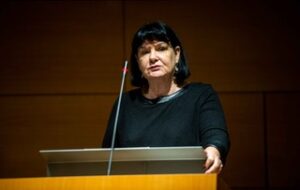
ITUC General Secretary Sharan Burrow
By joining with other movements, indigineous communities and territorially-based urban community networks, unions have created strong and successful coaltions. Since late 1990s as part of social pushback against neoliberal model, 14 countries have elected progressive governments and labor has been an important part of moving this unprecedented number of elections, he said.
Most recently, unions were part of successful coalitions that elected progressive governments in Honduras and Colombia and are constructing broad democratic fronts against new challenges from ethnonationalist and extreme conservative groups.
In Africa, “more often than not, unions were the only force fighting decolonization,” said Evance Kalula, chair of International Labor Organization (ILO) Committee on Freedom of Association and emeritus prof of law at the University of Capetown. “Formal and informal collaboration between unions as agents of change and nationalist movements.”
Kalula and co-author Chanda Chungu, contributed the chapter on “African Perspectives on Labor Rights as Enhancers of Democratic Governance.”
Julia Lopez Lopez, a professor at the University of Barcelona, described how unions are standing up to corporations that are using the new model of app-based work to exploit transportaton workers.
“The case of transport sector is one of the cases that show unions are trying to create new strategies against market intervention against multinational efforts to liberalize labor rights,” she said.
Lopez recently participated in research projects on precarious work and social rights led by the Working Lives Research Institute.
Closing the Conference, Sharan Burrow, general secretary of the International Trade Union Confederation (ITUC), overviewed the challenges facing workers and their advocates and pointed to recent legal successes as well, including an agreement that the ITUC and ILO achieved with the Qatar government that ensures more rights for migrant workers, including the freedom to leave their jobs and seek alternative employment.
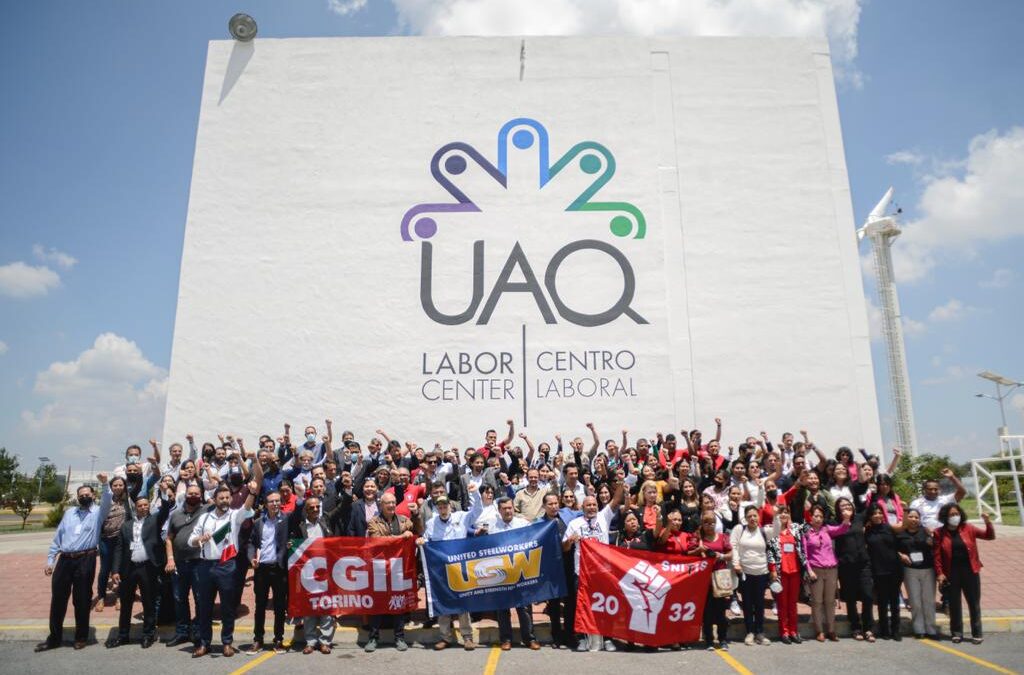
Sep 2, 2022
A new Labor Center in Mexico will advise workers about their rights and how to mobilize and organize unions and collectively bargain. The Labor Center, at the Autonomous University of Querétaro in central Mexico, is supported by the Solidarity Center and the UCLA Labor Center.
“The aim is to strengthen and promote the full recognition of labor rights, freedom of association and organization, and the democratic participation of workers through research, linkage and accompaniment,” said Labor Center Director Dr. Javier Salinas García. Salinas spoke at a recent Solidarity Center event in Mexico to announce the opening.
The Labor Center comes three years after Mexico’s government announced a series of comprehensive labor reforms to establish a democratic unionization process, address corruption in the labor adjudication system and eradicate employer protection (“charro”) unions prevalent in the country.
The Labor Center is “a way to respond to the needs of the situation,” said Beatriz García, Solidarity Center Mexico deputy program director.
“I think we all agree that Mexico is going through a historic moment. The labor reform responds to the demands that have been the objectives of the struggle of many workers for years, for decades, and reflects some positive practices of the independent unions,” she said.
The event featured a panel of independent union members and leaders who discussed the future of the labor movement in Mexico in the wake of historic labor law reforms.
Panelists explored the role that democratic and independent trade unions in promoting labor reform implementation in Mexico three years after the 2019 Labor Reform and negotiations of the United States–Mexico–Canada Agreement (UMSCA/T-MEC).
Speakers shared how they are using the tools of labor reform to organize on their worksites.
“We are the delegates, and we call our colleagues to share information about the Union League,” said Sonia Cristina García Bernal. “We have helped colleagues who were told they were going to be fired without severance pay. We have been able to get them severance pay. We have been able to get them rehired.”
“After these three years, the tool that we use the most is fast response mechanisms,” said Imelda Guadalupe Jiménez Méndez. “This has been a very important tool.”
In addition to Beatriz García, speakers included: Imelda Guadalupe Jiménez Méndez, Secretary for Political Affairs, the Miners Union (Los Mineros); Julieta Mónica Morales, General Secretary, Mexican Workers’ Union League (Liga Obrera Mexicana); Rita Guadalupe Lozano Tristán, Mexican Workers’ Union League (Liga Obrera Mexicana); Alejandra Morales, General Secretary, Independent Union of National Workers in the Automotive Industry; and Sonia Cristina García Bernal, Special Delegate, Mexican Workers’ Union League (Liga Obrera Mexicana).
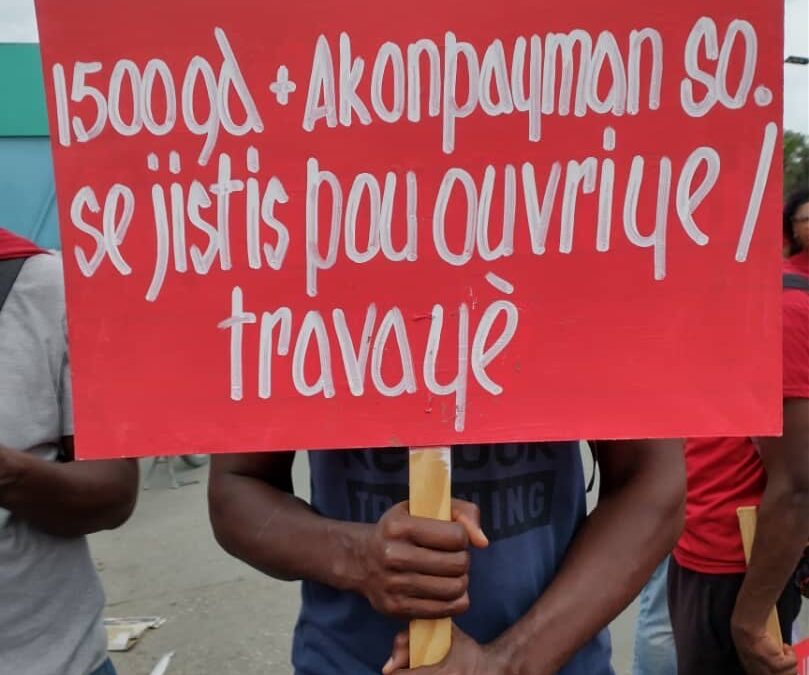
Aug 9, 2022
Haitian garment workers scored a huge victory as a coalition of unions negotiated an agreement with the government to provide garment workers in Port-Au-Prince with transportation and food stipends.
“In our struggle for a better working environment and fair wages we have always emphasized that the government should provide social support to workers, especially those in the textile sector. And here it is for the first time that our demands have been heard, even if it is not yet in effect, but the government has planned to accompany the workers by offering them transportation and food costs for an amount of 135,000,000 gourdes ($1,116,595),” said Telemarque Pierre, coordinator of SOTA- Batay Ouvriye.
“From now on, we would like the government to take care to include these accompaniments in the annual budgets so that the workers can always benefit from these advantages.”
The government will distribute the funds via a mobile app. The stipend will cover the cost of travel to and from the factory, and include a lunch stipend. Inflation and gang violence have led to skyrocketing prices for food and fuel such that workers cannot afford travel to and from work or food at lunchtime.
The agreement underscores the importance and effectiveness of unions in improving the lives of workers.
“We can say now that every time there is a problem, the workers come to the union because they always find that the unions are a real help,” said Eliacin Wilner, GOSTTRA organizer.
Unions are working to ensure that workers are aware of the program and able to access their benefits.
The agreement is the result of minimum wage protests by garment workers in January 2022. Fueled by frustration over three years without a minimum wage increase and the rising cost of basic necessities and services, workers at the SONAPI industrial park in Port-Au-Prince held a spontaneous protest to call for a wage increase.
The peaceful demonstrations extended into February and were met with police violence.
The protests led to negotiations between the government and a coalition of nine textile unions. The coalition’s advocacy resulted in an increase of the minimum wage from 500 gourdes ($4.82) per day to 685 gourdes ($5.85) per day.
Solidarity Center studies repeatedly have demonstrated the daily minimum wage is far less than the estimated cost of living in Haiti. Significant job losses due to supply chain disruptions have left most garment workers facing diminished working hours or layoffs, threatening their ability to provide for their families. These periods of income precarity are especially dire given that most low-wage garment workers lack savings.
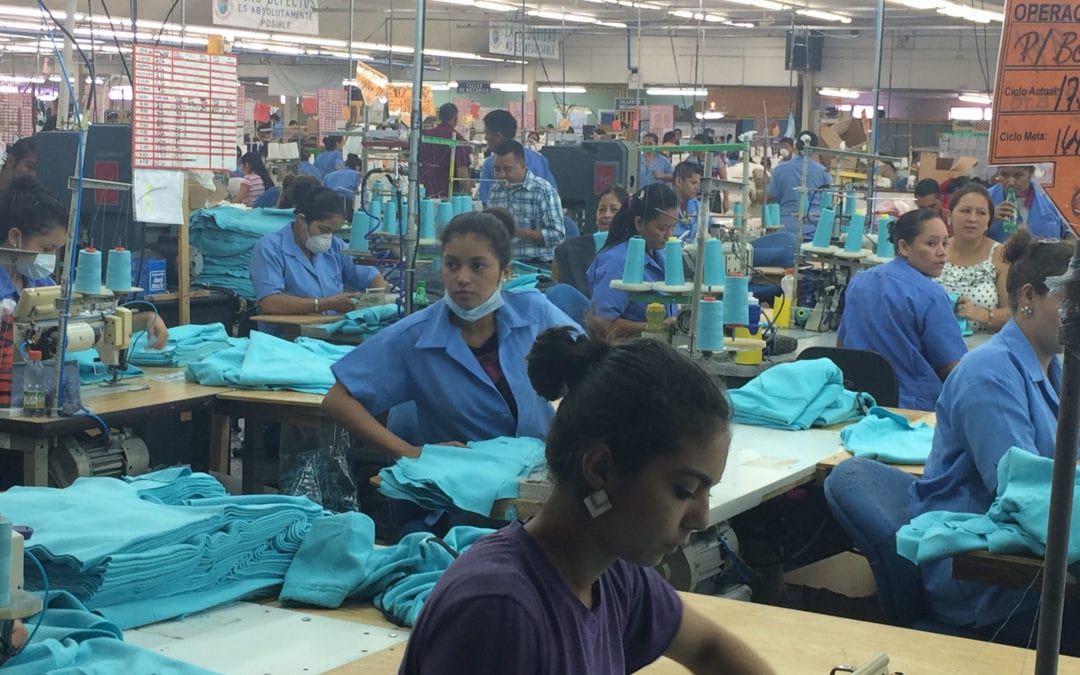
Jun 1, 2022
A powerful new report shows that collective bargaining changes work and workers’ lives for the better. According to the report, workers in Honduras with collective bargaining agreements are less likely to feel compelled to migrate or to face verbal abuse, and they earn more than workers without collective bargaining agreements. The Solidarity Center-supported report, “Bargaining for Decent Work and Beyond: Transforming Work and Lives Through Collective Bargaining Agreements in the Honduran Maquila Sector,” was published by the Center for Global Workers’ Rights.
“Collective bargaining ultimately is about transforming lives,” said Solidarity Center Executive Director Shawna Bader-Blau, who moderated a panel discussion launching the report. “Not only do better wages and working conditions result from collective bargaining, but workers report dignity and respect on the job for the first time through collective bargaining and unions.”
Report author Mark Anner, director of Pennsylvania State University Center for Global Workers’ Rights, highlighted some key findings of the report. He said:
- Workers covered by a collective bargaining agreement are 25.3 percent less likely to feel compelled to migrate than workers without a collective bargaining agreement.
- Honduran garment workers with a collective bargaining agreement are 67 percent more likely to always have the choice to work overtime or not.
- Workers not covered by a collective bargaining agreement are 20.3 percent more likely to face verbal abuse.
- Female workers without a collective bargaining agreement are 10.7 percent more likely to face sexual harassment on the job.
- Workers with collective bargaining agreements earn 7 percent more than workers without collective bargaining agreements.
“Workers experience tangible and intangible benefits from having collective bargaining agreements,” Anner said. He quoted some workers as saying, “We are listened to now” and “Management shows us respect as workers.”
The report documents the expansion of collective bargaining agreements in the maquila sector, following a 2009 binding agreement between workers and a garment manufacturer. As of last year, 50,625 workers, mostly in the garment industry, were covered by 21 collective bargaining agreements in the Honduran export assembly sector.
Bader-Blau emphasized that the report shows the importance of worker-driven research, as suggested by the Solidary Center. “Unions lead and show outcomes to the rest of the world through the power of their own stories,” she said.
Union leaders like Eva Argueta, a leader in organizing tens of thousands of garment workers in Honduras, led the process of connecting with workers to help them share their work experiences.
Speaking on the panel, Argueta, representative for the General Workers Central (CGT, Honduras) and Maquila Organizing Project coordinator, described the process. “The person responding is much more likely to trust someone that they know who is doing the survey,” she said. “It can be a delicate thing because of the fear the boss might find out.”
Worker-leaders interviewed a total of 387 workers with and without collective bargaining agreements.
Other panelists included Joel López, general secretary of the Independent Federation of Workers of Honduras (FITH), Tara Mathur, field director for the Americas at the Worker Rights Consortium (WRC), and María Elena Sabillón, Solidarity Center senior coordinator in Honduras.
As Sabillón shared in her remarks, “Collective bargaining agreements allow for real progress in both labor and human rights. CBAs today go beyond economic clauses. Unions are winning clauses on equality, combating violence and harassment in the world of work and respecting the dignity of each person. These CBAs are validating a broader rights-based approach.”



 “Many studies show that organized labor has played critical role in developing and defending democracy. The organized working class was the primary carrier of democracy,” Cornell said today at the International Lawyers Assisting Workers Network (
“Many studies show that organized labor has played critical role in developing and defending democracy. The organized working class was the primary carrier of democracy,” Cornell said today at the International Lawyers Assisting Workers Network (


